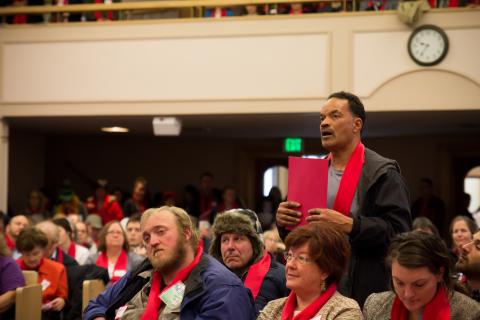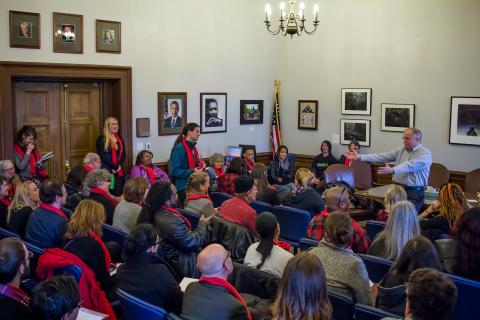Recent Blog Posts
Michele Thomas, Director of Policy & Advocacy
Kate Baber, Homelessness Policy and Advocacy Specialist
For a quick comparison of each of the three budgets, check out our new Budget Tracker here.
Housing Trust Fund and the Capital Budget
Neither the House nor Senate Capital Budget invest deeply in affordable housing. The Senate budget invests nothing. The House does a lot better with a $5 million allocation for energy efficient housing (this was originally in the governor’s budget). Go here for more information on this particular budget item and search for "High Energy Efficient". The House also allocates $2 million for weatherization of homes for low-income homeowners. This program pays for weatherization specialists to perform air-sealing work, to add insulation, to seal leaky duct seams, and to replace inefficient appliances in the homes of low-income residents. And the House budget also includes a $6 million pot that housing for people with chronic mental illness can apply for (although they will compete with a large list of other important capital needs related to treatment for people with mental illness). Additionally, the House also funds a handful of individual projects including a King County Housing Authority project called Vantage Point.
The Housing Alliance urges both the House and Senate to invest deeper in affordable housing.

Housing & Essential Needs (HEN) & Aged, Blind & Disabled (ABD) Programs
The House of Representative’s supplemental budget proposal makes no changes to HEN or ABD from last year. The 2013-2015 Biennial Operating Budget’s HEN and ABD appropriations are carried forward.
The Senate’s supplemental budget proposal assumes the passage of Senate Bill 6573, which would change the definition of disability for the HEN and ABD programs.
If passed, this bill would result in $850,000 in ABD and Medicaid savings due to ABD recipients moving from ABD to HEN, and from Presumptive SSI Medicaid to the expansion of Medicaid from the Affordable Care Act. The Senate proposes to transfer this savings to the Operating Budget’s General Fund. We support SB 6573, but believe the savings should be reinvested in HEN to accommodate the resulting HEN caseload increase. This is especially important since HEN is nearly at capacity and may not be able to serve a larger caseload of people without additional resources.
The Senate’s budget proposal also assumes $600,000 in HEN and ABD incapacity exam savings due to Medicaid expansion. This savings is transferred to the Operating Budget’s General Fund. We are concerned that this saving assumption is too high. And we believe any savings should be reinvested back into HEN and ABD rather than the general fund.
The Housing Alliance urges the legislature to pass SB 6573 and to reinvest its savings into HEN. Any incapacity exam savings should be reinvested back into HEN and ABD.

Temporary Assistance to Needy Families (TANF)
The House of Representative’s supplemental budget proposal reinvests $17.023 million in TANF underspend funds back into the program. This investment is an important first step to rebuilding this critical family safety net program, which was deeply cut during the Great Recession. Some of the highlights in the House budget that are closely related to homelessness and housing stability include:
- Creating a 15% incentive payment to families who meet DSHS engagement requirements. In 2011, the TANF cash grant was cut by 15% and is now $372/month for a family of two, or just 30% of the federal poverty level. This incentive payment will provide much needed resources to families to help pay for their basic needs, including rent and utility bills.
- Restoring the Additional Requirements for Emergent Needs (AREN) assistance amount to a maximum of $750 per household per year rather than per lifetime. AREN provides emergency housing and utility assistance to struggling families and helps them avoid eviction and homelessness. This appropriation would restore a 2011 budget cut, which reduced AREN assistance to $750 per lifetime. Currently, 13.6% of TANF families are homeless, so the restoration of AREN assistance is critical.
- Funding House Bill 2585, which will ensure kinship care providers who rely on unearned income, such as retirement income, have equal access to child-only TANF assistance. This bill will help low-income grandparents and other kinship care providers meet their families’ basic needs when they assume care of a child relative.
The Senate’s budget proposal reduces WorkFirst funding by $4.11 million, but does not cut the TANF cash grant. The Senate appropriates $52,000 to fund Senate Bill 6394, which expands kinship care providers’ access to child-only TANF.
The Housing Alliance urges the legislature to adopt the House of Representative’s TANF supplemental budget proposal since it makes significant investments to improve TANF families’ housing stability and economic security.



Add new comment